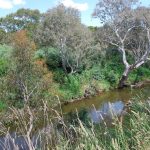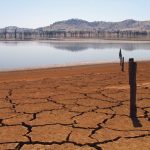 July 16, 2018 6:44 am
Published by Climate Extremes
July 16, 2018 6:44 am
Published by Climate Extremes
New research clearly demonstrates the potential to predict long-term LAI using simple ecohydrological theory. This approach could potentially be incorporated into existing terrestrial biosphere models and help improve predictions of LAI.
 July 6, 2018 2:18 am
Published by Climate Extremes
July 6, 2018 2:18 am
Published by Climate Extremes
This study evaluated GCMs for common drought metrics during the past 55 years. It found different models can produce very different simulations of drought, depending on the type of drought and metric analysed. The study points to a need to improve GCMs for droughts to reduce uncertainties in future projections.
 June 22, 2018 5:55 am
Published by Climate Extremes
June 22, 2018 5:55 am
Published by Climate Extremes
Presentations from the ARCCSS / CLEX Winter School 2018
 April 17, 2018 3:49 am
Published by Climate Extremes
April 17, 2018 3:49 am
Published by Climate Extremes
In 2005 the Amazon experienced a once in a century drought. Five years later, in 2010, it was struck by an even worse drought, with even lower rainfall occurring in the dry season. However, the response of the Amazon forest to these two once-in-a-century events showed marked differences.
 March 30, 2018 6:21 am
Published by Climate Extremes
March 30, 2018 6:21 am
Published by Climate Extremes
In a major achievement, a version of the Australian community land model is now running in the ACCESS modelling system. This version includes the science advances led by Mark Decker around hydrology and soil evaporation, and the science advances led by Martin de Kauwe and Jatin Kala. It also includes major bug fixes identified by collaborators in the UK, and by colleagues in CSIRO. For the first time, we have a version of the Australian community land model coupled with an up to date version of the UK Meteorological Office’s atmosphere model.
 March 13, 2018 11:48 pm
Published by Climate Extremes
March 13, 2018 11:48 pm
Published by Climate Extremes
Understanding which plant species can recover from drought, under what conditions and the processes involved, will help researchers predict plant mortality in response to global climate change. In response to drought, some species die because of embolism-induced hydraulic failure, while others recover, following rehydration. This research focuses on structures and processes that might allow some plants to recover from drought stress via embolism reversal.
 February 23, 2018 4:21 am
Published by Climate Extremes
February 23, 2018 4:21 am
Published by Climate Extremes
This study explored the key sources of uncertainty when scaling leaf-level understanding of water-use efficiency to ecosystem scales. The results provide key insights into interpreting (ecosystem-scale) eddy-covariance derived water-use efficiency in an ecophysiological context.
 February 23, 2018 3:19 am
Published by Climate Extremes
February 23, 2018 3:19 am
Published by Climate Extremes
This paper combines existing global evapotranspiration estimates to create a new global product with an observationally constrained estimate of uncertainty. It utilises the latest release of ground-based estimates to show that even point-based evapotranspiration estimates have information about much larger spatial scales.








